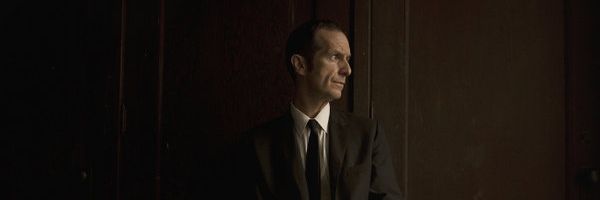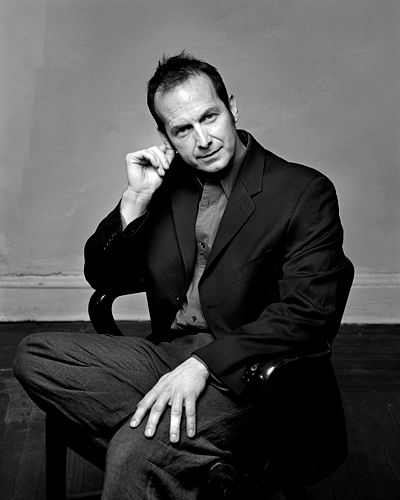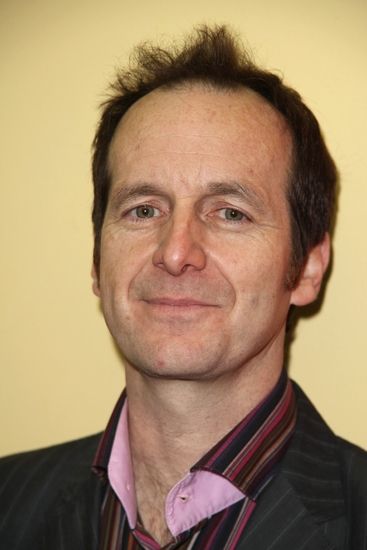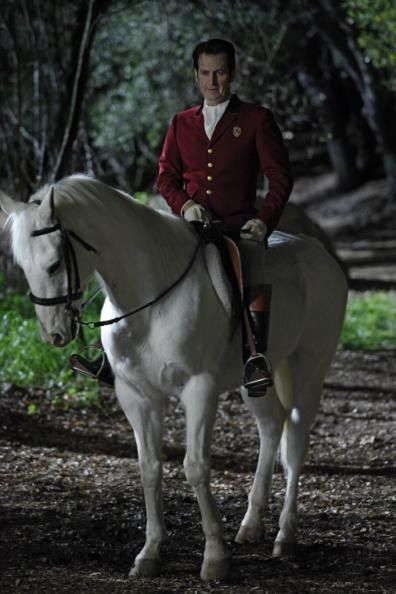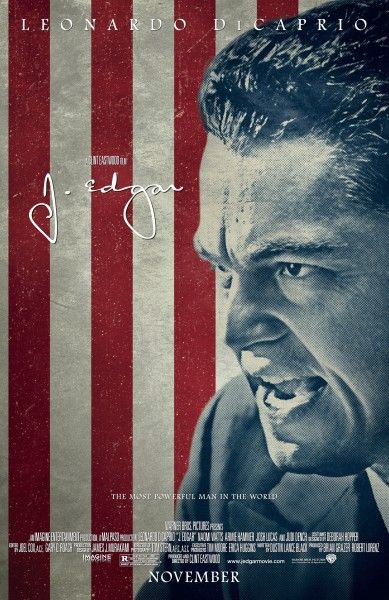FX’s psycho-sexual thriller American Horror Story, from executive producers Ryan Murphy and Brad Falchuk, revolves around the Harmons, a family of three who moved from Boston to Los Angeles as a means of reconciling personal anguish and getting a fresh start. But, they quickly discover that their new home comes with its own kind of baggage, as numerous heinous and terrifying acts have occurred there, and the property itself seems to have a strange effect on its residents.
During a recent exclusive phone interview with Collider, actor Denis O’Hare talked about the mysterious burned man that he plays on the show, how he sees Larry Harvey as both sympathetic and scary, the more than three hours of detailed make-up work he goes through to bring the character to life, and how he sees this as a show about our deepest fears. He also talked about how excited he is now that the door has been opened for Russell Edgington to return to True Blood in Season 5, his love for his character on The Good Wife, the experience of doing a role in Clint Eastwood upcoming drama J. Edgar, and that he’s preparing for a one-man show. Check out what he had to say after the jump:
Question: How did you get involved with American Horror Story? Were you looking to do another TV show, or were you approached about doing this role?
DENIS O’HARE: You know, I wasn’t looking to do another show like this. I have an ambivalence about TV because I don’t ever want to get stuck in any sort of rut, or in any series, so I hadn’t necessarily been looking for a big gig. I had just come off of J. Edgar, with Clint Eastwood, and was staring into the abyss of an empty summer. And then, I got a phone call from my agent saying that Ryan Murphy wanted to speak with me. I had never met the man, but had, of course, heard of him. I was an admirer, but didn’t quite know what to expect.
So, he called up and was very direct, and very interesting and wonderful, and he basically said, “I’m creating a new series, and I would love for you to read the script.” I was like, “All right,” so he sent me the script and I read it, over the weekend. On Monday, he called back and said, “What do you think?,” and I told him that I thought it was really unusual and interesting, and I was intrigued by the part that he asked me to look at. He explained a little bit about what Larry would be and do, and then he said, “Would you do it?” I said, “Yes,” and he said, “Okay,” and we got the deal made really quickly, in three or four days. It was crazy.
Because a lot of this show is very visual, was that apparent on the page, when you read the pilot?
O’HARE: I think a lot of it is based on trust. You have to trust that Ryan Murphy and Brad Falchuk are going to be able to deliver something that you don’t see. When you read it, the script is an indication of what will come, like a libretto for an opera. Without the music, it doesn’t make any sense. You can’t just read a libretto and get everything, until you actually get to see the whole thing done, see the editing, get to hear the music, and get to see the visual. This is an extraordinarily stylized and beautifully shot series. The acting is very important, but the camera work, the editing, the music, the style, and the world of it are also really important. It’s half the character. So, you have to go on trust. You trust that this is a brilliant guy, with Ryan, and a brilliant team with Brad, and that they have created some really memorable things, and that they’re going to do it again.
How would you describe this series to people?
O’HARE: It is difficult. I’ve said it’s like The Shining meets Twin Peaks meets The Amityville Horror meets Lars Von Trier’s The Kingdom. It’s got elements of all of that. It’s got the weirdness of the population of Twin Peaks, it’s got the crazy momentum of The Shining, and it’s got the haunted house, slow motion reveal of The Amityville Horror. But, ultimately, it’s its own thing and it lives in the mind of Ryan Murphy. In a year or so, I think you’ll hear people starting to say, “Yeah, it’s like American Horror Story,” and use this as a reference because it’s so unique.
Who do you think the audience is, for this show?
O’HARE: That’s a good question. I don’t know the answer to that. I think there’s a really big overlap between sci-fi and horror, and then there’s also a big overlap between the normal TV viewer and horror. Horror, unlike sci-fi, doesn’t feel like such a niche genre. When you’ve got unbelievable actors like Connie Britton, Jessica Lange, Dylan McDermott and Frances Conroy, you’re going to be drawing in a different dynamic. Jessica Lange, alone, raises the bar so high that it peaks people’s interest. Connie Britton, coming off the success of Friday Night Lights, certainly brings an audience with her. We may even get some vampire fans watching the show. It’s FX, so they already have their own built-in demographic. People are watching Sons of Anarchy, and other shows. I’m curious to see what actually happens.
How much were you told about this character and who he is, when you signed on? Were you given that history, or is that something you fill in, along the way?
O’HARE: I wasn’t given a whole lot. I was given some stuff. I was obviously given the pilot, so I knew what that was. But, this is an odd character. It’s a character that you understand by implication or metaphor, as an actor. If you’ve seen the posters for American Horror Story, they’re not literal. It’s a picture of a guy in a black rubber suit, against a red background, suspended from the ceiling, over a pregnant woman. That’s completely subliminal and the stuff of nightmare. In a similar way, when dealing with this character, I don’t think about it in literal terms, but I think about it in metaphorical terms. What is his function? What is his dreamscape? I think of him as a Dante-esque figure, stuck in the 5th Circle of Hell and struggling to get out. The literal stuff, ultimately, in a strange way, is not as important as the psychological or metaphorical understandings, and finding a way to understand him that way. As the series develops, even what we think we know about him is not accurate.
Do you see Larry Harvey as a guy that is deserving of both fear and sympathy?
O’HARE: Totally. I think that’s what draws me to it, and I think that’s what makes the writing something more than just genre. I think the series, ultimately, is incredibly deep, in terms of psychology. Even in the pilot episode, we see Larry being a menacing, twisted, awful figure who then, during the scene with Dylan McDermott on the bench, becomes an object of pity who is absolutely a human character feeling incredible amounts of pain. That, to me, is fascinating.
Do you see Larry as someone who is evil, or do you think he’s also trying to repent for what he’s done?
O’HARE: To me, he’s definitely not evil. Evil is such a simplistic way to describe any character, be it Iago or Caliban, or any character from history. What I’m attracted to is the fact that he, like everyone, is yearning to be loved, to be released, to be redeemed, and to be at peace. Each episode only adds more complications to it. I’m always getting so much information that is new.
How long does the make-up process take, and what does that add to your ability to find this character?
O’HARE: It’s about three to three-and-a-half hours. There’s a lot of detailed work that has to be done. I love make-up and things like this because it’s a short-cut for character. You don’t have to act, when you look a certain way. You can let the costume and make-up do the work. And, the way that people around you treat you, helps make your character and puts you into it. I find that, as we’re going through the make-up process, I get lulled into the character, over the hours. It’s really an interesting evolution.
How was this particular look decided on?
O’HARE: They knew what they wanted. There was a design, early on, and they did a head cast and an arm cast of me. The make-up people put the look together and put it on me, and it’s been pretty much set since then. The design was pretty perfect.
Because this is a character that really takes you to darker places, is it more difficult to get back out of that, especially with the make-up?
O’HARE: Unlike a normal character, I don’t have to snap into it. I gradually get into it and become it, and then similarly, I gradually get out of it. It’s a strange thing, when you’re working on a set. Who you are, when you go to the set, is already a stripped down version of yourself anyway. You’re not bringing your entire life experience, and you know each other via this story, this community and this atmosphere. You’re already getting into character, when you step onto the set.
Are you normally a fan of this type of genre?
O’HARE: I’m not into what I would call torture porn, like all the Saw movies and those kinds of things. I find that repugnant. We have enough violence in this country that I don’t feel like I need to sit through that stuff, and I don’t see the point of it. But, good old-fashioned horror, I love. I love monsters, I love creatures, I love beings, I love aliens. That’s more supernatural and more the stuff of fairy tales. Fairy tales are as ancient as we are. I love those stories. I think they’re really interesting because they always have more than simply the fright aspect. There’s something deeply psychological. When you think of Grimm’s fairy tales, they are deeply, deeply psychological. They’re so powerful, so bloody, and really, really disturbing. Think about five-year-olds reading that stuff. Even Little Red Riding Hood is a really freaky story. Grandma is gobbled up by a wolf, and the wolf is going to eat the girl. That’s scary stuff. They’re about our deepest fears. And, this show is about our deepest fears. It’s a way to exorcize them or understand them.
Especially with this type of subject matter, has it been really reassuring to see much FX is really behind the show?
O’HARE: They’ve been fantastic! When I saw the pilot, I thought, “Well, of course, they’re behind the show. It’s fantastic!” What a relief for the brass at FX to see that pilot and go, “Wow, we made the right decision. This is completely worth everything.” It was such a great, unique and well-done pilot that I can imagine how excited they were. And, they have been promoting it and supporting it beautifully. I think it will pay them back, in spades.
As much as you must have been asked, over the last season, whether or not Russell Edgington would return on True Blood, was exciting to finally have that door opened for this coming season?
O’HARE: Hell, yes! I had been hearing rumors and things, but until I actually heard that there was a script, in which they went to the parking lot and found a hole in the ground and chains, I wasn’t sure. I’ve been in contact with people from True Blood, and I’m friends with a lot of them, and Joe Manganiello, who plays Alcide, actually told me first. He was like, “Dude, there’s this scene where I go to the parking lot and you’re not there anymore,” and I went, “Yes!” I’m really thrilled. I love that family. Alan Ball is such a spectacular person to be around and to work for. I’m really excited to get to go back and join them, and I love the character. I can’t wait to pick up where he left off.
Have you thought about how he could be now, with the time that’s passed?
O’HARE: He could change. His experience has, maybe, redefined him and shaped him differently.
Are you surprised with how much everyone truly loved the character?
O’HARE: I was. I didn’t expect it, and I was a little shocked, but ultimately, I’m really pleased. It’s a very nice thing to have happen. I was really thrilled.
Is it fun to also do a very different character on The Good Wife, playing Judge Charles Abernathy?
O’HARE: Oh, I love him! Between New York and L.A., and all of us who are actors, I feel like we’re just one big, cast repertory company, all running back and forth between the coasts and between different shows. There is a wealth of great character actors, who show up, here and there, on different shows. I love the fact that we’re allowed to do that. I love the fact that people continue to hire me and give me jobs. It’s a real gift. I feel very, very lucky to have the opportunity.
Who did you play in J. Edgar, and what was that experience like?
O’HARE: I actually played a character in the Lindbergh-Hauptmann trail. There’s an aspect of the film that deals with the Lindbergh kidnapping trial, and I played a handwriting expert. It’s a fairly small part, but I was thrilled to do it, just because I love Clint Eastwood. I had done The Changeling with him, and couldn’t say no to seeing him again. I had some scenes with Armie Hammer and Leonardo DiCaprio, and was very excited to be able to work with those guys. Clint creates a great set and it’s a great family. To be able to go back and work with him again was an opportunity I couldn’t pass up. It was great. It’s a historically interesting time, and it’s going to be beautifully presented and shot. It’s so lush. It’s pretty vast. For him, it’s a pretty massive production.
Are you hoping to continue to juggle all of these roles, with television and film? Is that getting more difficult to do, the more roles you accumulate, or is it just really fun?
O’HARE: It’s been a lot of fun, and who knows how long it will last. I wish I had the problem that they were going to continue forever, but I always have to realize that all things come to an end, and things play themselves out and people move on. I’m grateful for what I have, at the moment. I’m actually going to be doing a one-man show that I’ve co-written with my friend, Lisa Peterson, at the New York Theatre Workshop in January, February and March. It’s a play based on The Iliad, called An Iliad, and we’ve been working on it for six years. I’ve always had my own work in mind, creating my own opportunities. And, I’ve got a screenplay I’d like to shoot next summer, and I’m working on that. I’m making sure I’m moving forward.
Is it daunting to take on a one-man show, or is that part of the thrill of it?
O’HARE: Oh, it’s absolutely terrifying, on every level. I’ve done things in the past, like this. I’ve done big shows where I’ve had the majority of the material. But, this is the first one where I’ll be doing a show where I’m the only person there, for the whole evening. And I co-wrote it, so I’m responsible for what I’m putting myself through. I can’t blame anyone else.

